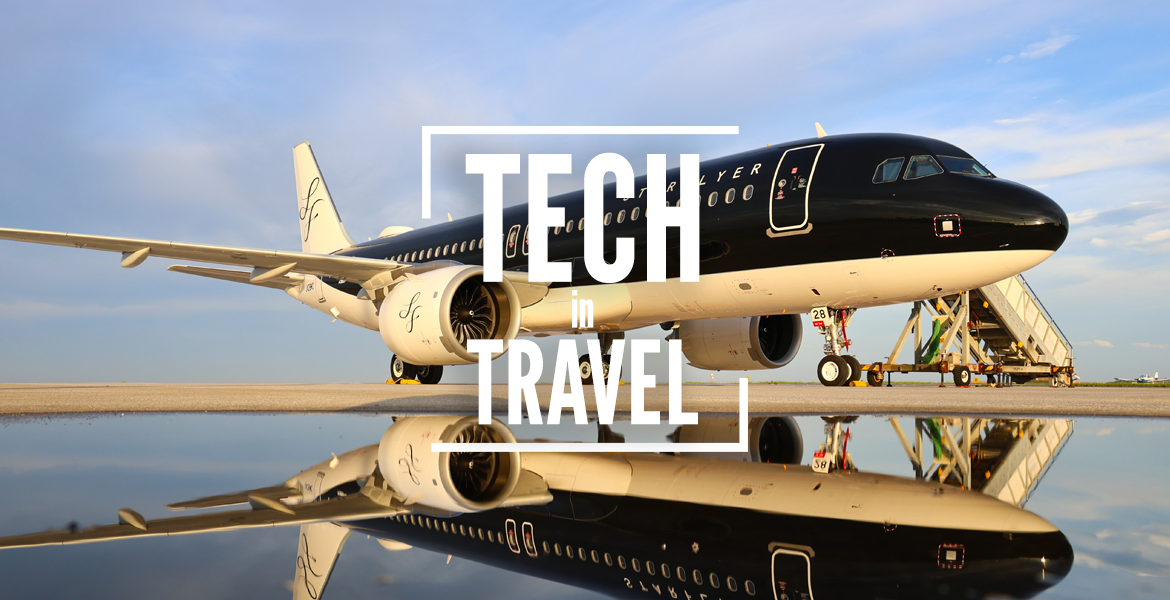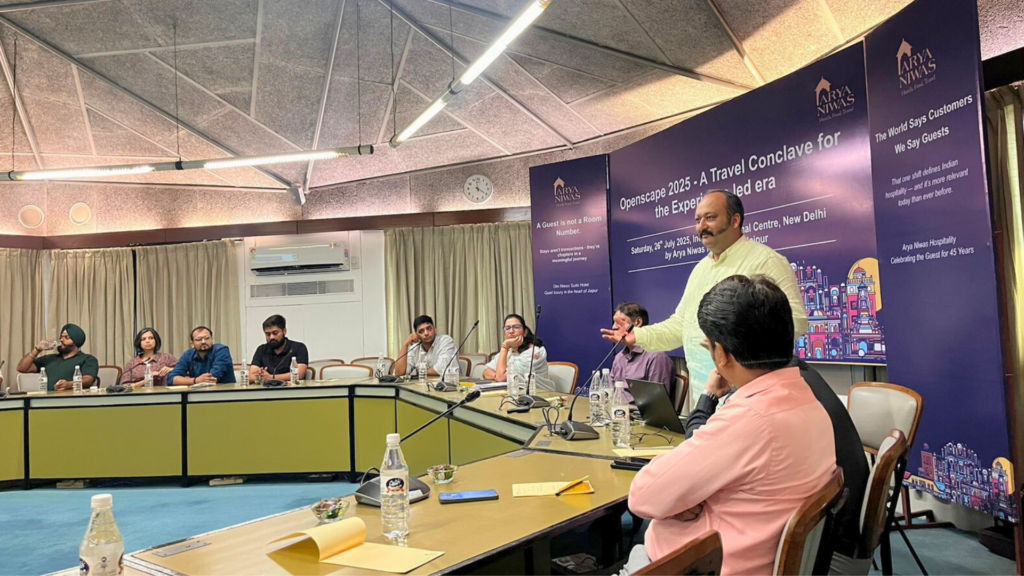AI in Travel
Shorter, cozier tours. DerbySoft’s AI agent. STARFLYER upgrades loyalty. MakeMyTrip’s successful new platform.

Shorter, cozier tours. DerbySoft’s AI agent. STARFLYER upgrades loyalty. MakeMyTrip’s successful new platform.
Arival report cites shorter tours, smaller groups – travellers prioritize intimacy and convenience
Travellers in the U.S. and Europe are increasingly opting for shorter, smaller, and more flexible tour experiences, according to Arival’s 2025 Tour Taker report, with input from 800 U.S. and 1,600 European travellers. In 2024, 69% of travellers took tours lasting three hours or less, and half booked at least one private tour. Small group formats—six people or fewer—were especially popular, chosen by 50% of Americans and 43% of Europeans. Douglas Quinby, CEO of Arival, summed up the shift bluntly: “Travellers want experiences that fit into their plans, not the other way around.” This demand for convenience and personalization is prompting tour operators to rethink their offerings, moving toward agile, mobile-friendly formats.
The report also highlights generational and regional differences. Younger travellers are leaning toward immersive, participatory experiences, while older travellers still favor classic sightseeing. Meanwhile, booking behaviors are increasingly last-minute—70% of Americans and 61% of Europeans book tours less than a week in advance, often via mobile. Despite 72% of Americans booking before they arrive, the trend points to the growing importance of real-time availability and frictionless digital booking systems.
DerbySoft launches AI voice agent to automate outbound calls to suppliers
DerbySoft has launched its new AI Voice Agent, a tool designed to automate high-volume outbound calls to hotels, streamlining tasks traditionally handled manually by travel agents. This solution addresses a major pain point in business travel, where over 30% of global hotel bookings still require manual intervention. The AI Voice Agent handles common but repetitive calls—such as confirming booking details, verifying virtual credit card payments, requesting post-checkout invoices, and managing booking changes—delivering accuracy and scalability across time zones with full GDPR compliance.
The impact has been immediate: companies using the AI Voice Agent have reported a 70–90% reduction in manual call-related costs, and in pilot programs, over 75% of bookings no longer required human follow-up. “Let’s face it, calling properties all day isn’t scalable, fun, or efficient,” said Nadim El Manawy, Head of Business Travel Solutions at DerbySoft. The system integrates easily into existing workflows via API or CSV, and future use cases—like RFP follow-ups and group booking confirmations—are already in development.
STARFLYER upgrades loyalty platform with IBS software
STARFLYER Inc., Japan’s premium airline, has revamped its STAR LINK loyalty program by partnering with IBS Software and adopting the iLoyal platform. This upgrade replaces STARFLYER’s legacy in-house system with a modern, cloud-native solution that enhances digital integration across domestic and international passenger service systems. The upgrade includes a fully overhauled mobile app and member portal, offering real-time updates, digital membership cards, and exclusive rewards.
The upgrade also allows STARFLYER to personalise customer interactions using IBS Software’s customer-centric engine, supporting more targeted engagement and communications. According to Hiroshi Goto, STARFLYER’s SVP of Innovation Promotion, this marks “the first move in a broader digital overhaul that will elevate every stage of the passenger journey.” IBS Software’s VP Marcus Puffer added that the partnership demonstrates iLoyal’s flexibility and scalability, especially for mid-size carriers looking to modernise. The initiative supports STARFLYER’s ambition to digitally transform its customer experience and partner relationships.
MakeMyTrip shares revenue and bookings increases after launching experiences platform
MakeMyTrip has launched a global experiences booking platform for Indian travellers, offering over 200,000 activities across 1,100 cities in 130 countries, aiming to simplify the fragmented process of booking tours and activities abroad. Travellers can now book experiences in Indian rupees and manage them alongside flights and hotels within the app. The launch coincides with strong Q1 fiscal 2026 results: gross bookings rose 12.4% to $2.61 billion, revenue increased 5.6% to $268.8 million, and adjusted net profit grew to $49.4 million. While air and bus ticketing saw revenue growth, hotel and package revenue dipped slightly. CEO Rajesh Magow emphasized the company’s long-term confidence despite short-term travel disruptions in India, citing the strength of MMT’s diversified business model.
Information overload is driving up agency costs and affecting customer experience
A new global survey commissioned by Sabre reveals that content fragmentation is significantly impacting travel agencies, with 91% operating four or more booking systems and over half managing seven or more. This complexity is driving up operational costs, straining productivity, and diminishing customer service. In response, Sabre has launched the SabreMosaic Travel Marketplace while leveraging AI to simplify workflows, surface relevant offers, and reduce tech overhead. The platform supports 38 NDC airlines, over 2 million lodging options, and dozens of car and rail providers—all accessible through one connection.
The survey also highlights that over 80% of agents believe unified access could cut costs, and 91% see AI as a path to better productivity and customer experience, though 41% are wary of AI’s long-term workforce implications.
AI in Travel
With focus on AI, sustainable travel Arya Niwas organises Openscapes 2025 in New Delhi

The opportunities and challenges that issues like artificial intelligence, sustainability and experiential travel pose to the tourism industry in India and overseas were highlighted at Openscapes 2025, a travel conclave in New Delhi on Saturday.
Organised by Arya Niwas, a hospitality group based in Jaipur, the conclave served as a participative platform to explore transformative ideas for the tourism sector, addressing pressing issues such as sustainability, experiential curation, the role of artificial intelligence (AI), and the integration of responsible practices into the travel experience.
Drawing stakeholders from across India’s hospitality industry, the conclave was organised with the core theme of Projecting India and Rajasthan with a stronger, more meaningful narrative.
“This is the first conclave. It is called Openscapes. We hope that we will be having more such dialogue-based conclaves on travel. There is a need for us to behave as one in the travel industry and to move forward together because the ultimate aim is to serve the guests and make the guests win,” Pooja Bansal, Owner and General Manager, Arya Niwas, told India & You on the sidelines of the event.
The urgency of the issues raised at the meeting was underscored by leading tour operators, who highlighted that Indian tourism, particularly in recent years, “has not been sustainable and things have gone really, really bad.”
The conclave drew stakeholders from across India’s hospitality industry
“When we talk about sustainability with experiential tourism, the experience at the grassroot level, meeting local people with a bit of sustainability, offers eye-opening encounters. Yet, there are challenges,” Navneet Arora, Managing Director, VINString Holidays, a travel agency in New Delhi, told India & You.
The meeting illustrated both obstacles and achievements in rural and urban experiential tourism. Operators cited instances where visitors’ immersion in heritage neighbourhoods and private homes fostered mutual pride among locals and tourists. However, they also warned against approaches that leave rural residents feeling like “monkeys in the zoo,” underscoring the necessity of responsible, respectful interaction, something now addressed by ensuring a share of tour proceeds benefit the communities involved. Sustainability, participants argued, extends well beyond eco-friendly rhetoric.
The conclave highlighted innovative tour formats, slow tourism, creative workshops and direct engagement with artisans, as pathways for deeper, more rewarding guest experiences.
“I think that is the call for the future, because automation has to come in. If we are not doing automation today, we are backwards. AI is important. The event opens up eyes for a lot of people. Difficult, but yes, AI and sustainability are important and doable,” Arora added.
“The interpretation of sustainability has become very cliché. This was a session to break that,” said Bansal.
Participants at the Openscapes 2025 called for a sustained dialogue, with suggestions for sector-wide conventions and targetted sessions on marketing and AI and more collaborative initiatives.
AI in Travel
Sabre Corporation’s Strategic Partnership with Christopherson Business Travel and Its Implications for Undervalued Cloud and AI Stocks

Sabre Corporation (NASDAQ: SABR) has long been a cornerstone of the global travel technology sector, but its recent strategic partnership with Christopherson Business Travel marks a pivotal evolution. By leveraging its AI-driven platform and cloud-native infrastructure, Sabre is not only modernizing corporate travel management but also positioning itself as a catalyst for growth in the undervalued travel tech sector. For investors, this collaboration offers a compelling case study in how AI and cloud innovation can unlock long-term value in a niche yet resilient market.
A Strategic Alliance for the Future of Corporate Travel
On July 17, 2025, Sabre announced a multi-year agreement to become Christopherson Business Travel’s primary technology partner. This partnership is more than a transactional arrangement—it’s a strategic alignment of two companies aiming to redefine corporate travel through automation, real-time data, and personalized service. Sabre’s AI-powered tools, including Sabre Red 360, Trip Proposal, and Market Intelligence, will streamline operations for Christopherson, enabling faster decision-making and enhanced client offerings.
The integration of Sabre’s cloud-native infrastructure into Christopherson’s proprietary Andavo platform is particularly noteworthy. This move allows for real-time orchestration of multi-source content (air, hotel, rail, ground) and seamless API-driven integrations, reducing manual effort and improving scalability. As Chad Maughan, CTO of Christopherson, noted, Sabre’s architecture provides the operational flexibility needed to adapt to evolving client demands—a critical advantage in the post-pandemic corporate travel landscape.
Sabre’s Financial Resilience and AI-Driven Growth
Sabre’s financial performance in 2024 underscores its transition from a turnaround story to a growth-oriented entity. Revenue increased to $3 billion, with adjusted EBITDA rising to $517 million—a 54% year-over-year improvement. While IT Solutions revenue dipped due to de-migrations, the Travel Solutions and Distribution segments grew by 4% and 6%, respectively, driven by demand for Sabre’s AI-powered tools.
The company’s market cap of $1.222 billion pales in comparison to AI/cloud giants like Databricks ($62 billion) or Snowflake ($43.6 billion), but this undervaluation reflects Sabre’s niche focus. Its strategic investments in Sabre Mosaic—a modular platform combining AI, cloud, and traditional agent workflows—position it to capture a larger share of the corporate travel market, which is projected to grow as businesses prioritize cost optimization and efficiency.
The AI/Cloud Travel Tech Opportunity
The broader travel tech sector is undergoing a transformation fueled by generative AI. According to Skift Research, AI-driven tools could create a $28 billion+ opportunity for the industry, with applications in personalized itineraries, dynamic pricing, and automated customer service. Sabre’s Automated Exchanges & Refunds and Agency Retailer solutions are already streamlining post-booking processes, reducing manual intervention by up to 70%.
However, Sabre is not alone in the race to monetize AI in travel. Competitors like C3.ai (NYSE: AI), Marvell Technology (NASDAQ: MRVL), and DigitalOcean (DOCN) are also leveraging cloud and AI to drive growth. C3.ai’s predictive analytics tools, for instance, have secured government contracts worth $450 million, while Marvell’s AI-optimized chips are powering data centers for hyperscale providers. Yet, Sabre’s deep vertical integration into travel-specific workflows gives it a unique edge in the corporate travel niche.
Why Sabre Is an Undervalued Investment
Despite its strategic advantages, Sabre remains overlooked by many investors. Its current price-to-earnings ratio (P/E) of 8.5 is significantly lower than the industry average of 18.5, and its hedge fund ownership (11.2%) suggests growing confidence in its AI-driven roadmap. The partnership with Christopherson is a validation of Sabre’s value proposition: it enables the company to scale its AI/Cloud offerings without overhauling existing systems, a critical factor for travel agencies seeking cost-effective modernization.
For investors, the key question is whether Sabre can replicate its success in other verticals. The company’s PowerSuite Cloud platform, which automates operations and integrates NDC content, is already gaining traction among mid-sized travel agencies. If Sabre can expand its footprint in the corporate and leisure travel markets, its revenue could outpace the 10% growth projected by analysts.
Conclusion: A Strategic Bet on AI-Driven Travel
Sabre’s partnership with Christopherson Business Travel is a microcosm of the broader shift toward AI and cloud-native solutions in travel technology. While the company may lack the valuation of tech giants like Microsoft or Google, its focus on vertical-specific innovation and operational efficiency makes it a compelling play for investors seeking exposure to the travel sector’s AI revolution.
For those considering a diversified portfolio, Sabre offers a unique blend of undervaluation and growth potential. However, it should be viewed as a complementary holding to broader AI/cloud stocks like C3.ai or Marvell, rather than a standalone bet. As the travel industry continues to embrace AI-driven automation, Sabre’s ability to deliver scalable, client-centric solutions will likely drive long-term value for both its partners and shareholders.
AI in Travel
AI Travel Tricks: Watch Out for the Road to Nowhere – Herald/Review Media

AI Travel Tricks: Watch Out for the Road to Nowhere Herald/Review Media
Source link
-

 Brand Stories6 days ago
Brand Stories6 days agoBloom Hotels: A Modern Vision of Hospitality Redefining Travel
-

 Brand Stories1 day ago
Brand Stories1 day agoCheQin.ai sets a new standard for hotel booking with its AI capabilities: empowering travellers to bargain, choose the best, and book with clarity.
-

 Destinations & Things To Do7 days ago
Destinations & Things To Do7 days agoUntouched Destinations: Stunning Hidden Gems You Must Visit
-

 AI in Travel7 days ago
AI in Travel7 days agoAI Travel Revolution: Must-Have Guide to the Best Experience
-

 Brand Stories3 weeks ago
Brand Stories3 weeks agoVoice AI Startup ElevenLabs Plans to Add Hubs Around the World
-

 Brand Stories2 weeks ago
Brand Stories2 weeks agoHow Elon Musk’s rogue Grok chatbot became a cautionary AI tale
-

 Destinations & Things To Do1 day ago
Destinations & Things To Do1 day agoThis Hidden Beach in India Glows at Night-But Only in One Secret Season
-

 Asia Travel Pulse3 weeks ago
Asia Travel Pulse3 weeks agoLooking For Adventure In Asia? Here Are 7 Epic Destinations You Need To Experience At Least Once – Zee News
-

 AI in Travel3 weeks ago
AI in Travel3 weeks ago‘Will AI take my job?’ A trip to a Beijing fortune-telling bar to see what lies ahead | China
-

 Brand Stories3 weeks ago
Brand Stories3 weeks agoChatGPT — the last of the great romantics

You must be logged in to post a comment Login